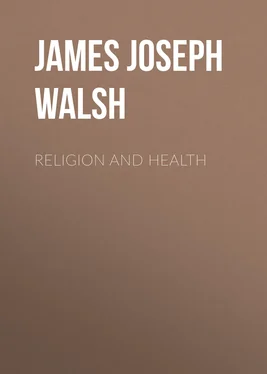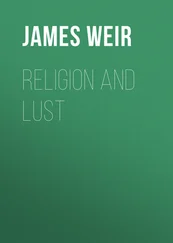James Walsh - Religion And Health
Здесь есть возможность читать онлайн «James Walsh - Religion And Health» — ознакомительный отрывок электронной книги совершенно бесплатно, а после прочтения отрывка купить полную версию. В некоторых случаях можно слушать аудио, скачать через торрент в формате fb2 и присутствует краткое содержание. Жанр: foreign_prose, foreign_religion, Здоровье, foreign_antique, на английском языке. Описание произведения, (предисловие) а так же отзывы посетителей доступны на портале библиотеки ЛибКат.
- Название:Religion And Health
- Автор:
- Жанр:
- Год:неизвестен
- ISBN:нет данных
- Рейтинг книги:4 / 5. Голосов: 1
-
Избранное:Добавить в избранное
- Отзывы:
-
Ваша оценка:
- 80
- 1
- 2
- 3
- 4
- 5
Religion And Health: краткое содержание, описание и аннотация
Предлагаем к чтению аннотацию, описание, краткое содержание или предисловие (зависит от того, что написал сам автор книги «Religion And Health»). Если вы не нашли необходимую информацию о книге — напишите в комментариях, мы постараемся отыскать её.
Religion And Health — читать онлайн ознакомительный отрывок
Ниже представлен текст книги, разбитый по страницам. Система сохранения места последней прочитанной страницы, позволяет с удобством читать онлайн бесплатно книгу «Religion And Health», без необходимости каждый раз заново искать на чём Вы остановились. Поставьте закладку, и сможете в любой момент перейти на страницу, на которой закончили чтение.
Интервал:
Закладка:
President Schurman of Cornell in an address before the Liberal Club of Buffalo thirty years ago, 1 1 "Agnosticism," Scribners, New York, 1895.
reminded us that there are a number of people who are always ready to proclaim the end of religion and to weep for it. Religion continues to be as living a force and as lively as ever in spite of their proclamations, and this has been true generation after generation practically since the beginning of Christianity. President Schurman said:
"Every now and then we hear the requiem of religion chanted alike by the spirits who mock and by the pious souls who have 'no language but a cry.' I suppose we shall always have professional mourners. But it is greatly to be desired that their services should not be prematurely given. If there is anything in the world that is alive and active, it is just this religious spirit, for whose demise certain mourners go about the streets. The body of religion changes, the spirit and the life abide forever. To the assertion that religion is defunct, I reply by pointing to the intense interest which men to-day everywhere feel in religion. It was recently stated by a Massachusetts Judge—Burke observed truly that we Americans like to appeal to the law—that there is nothing in the world perennially interesting but religion. The ground of this dictum is to be found in the constitution of humanity; for the human soul which the things of sense fail to satisfy can attain its true home and its complete self-realization only in conscious communion with the Spirit behind the veil."
The recent death of Mrs. Humphry Ward recalled the experience with regard to her book "Robert Elsmere." In a certain narrow circle of intellectuals it was supposed that this novel represented a veritable death blow to a series of compromises which had permitted people familiar with modern progress and science, and especially with the higher criticism, to continue to practice their religion in peace in spite of the fact that belief had long since departed. How amusing it is now and indeed how almost incomprehensible to learn that Mrs. Humphry Ward's husband, a well-known English critic, suggested shortly after its publication that her novel had "shaken the very pillars of Christianity." It is surprising indeed how often the foundations of religion are supposed to have been completely undermined, and yet the edifice itself continues to stand and to be the shelter for the vast majority of mankind from the buffetings of a world that without it would be almost shelterless for them and a place of trial too hard to bear.
Men are incurably religious, and just as no tribe has been found, however low in the scale of savagery, which has not formulated for itself some system of worship of a higher power and definite feelings of dependence on it, so even those whose minds under the influence of certain phases of intellectual development lead them away from formal religion find deep in their hearts the belief and appreciation of their relations to a power that makes for good, even though it may be difficult to understand the mystery of it. Long ago the Scriptural expression was formulated that only the fool who thinketh not in his heart says there is no God. Due acknowledgment of the thought in practice, however imperfect it may be, is religion.
Religion has been with us for all the period that we know anything about man, for the very cave man buried his dead with manifest confidence in a hereafter, and there seems no doubt that it will be with us until this stage of mundane affairs has passed. It affects the body as well as the mind, as indeed do all the great modes of thought, and it deserves to be cultivated, not only for its effect on the soul but also on the mind and heart and the bodily powers. There is no doubt at all that it means very much, and there is only the question of facing its significance for the whole man candidly and straightforwardly.
CHAPTER I
CAN WE STILL BELIEVE?
There is no doubt that man's quite instinctive attitude toward the mystery which surrounds him, out of which he came and into which he goes, has always so influenced his attitude of mind toward his body and its processes as to affect them deeply. The medicine man with his appeal to the religious as well as the superstitious feelings of man always had a potent influence over the most primitive of mankind, but culture has not obliterated this source of special reaction in men. Even now, for the great majority of men it still remains true that no matter how vague their religious instinct may be, it continues to affect, to a notable extent, their physiological and psychological functions. An eclipse of the religious instinct is at the basis of the increase in suicide and also undoubtedly of insanity in our day. The lack of an abiding faith in Providence is the source of many dreads and worries that affect health. Every physician is sure to know of highly educated patients whose ills reflect their mental relation to the mystery of life and whose symptoms take on or lose significance, according to their religious feelings.
The question that in our time, however, is coming insistently into a great many minds is, Can we, as intelligent human beings, reasonably in touch with man's recent progress in science, be fair with ourselves and still continue to believe in the great religious truths that affected our ancestors so deeply? While we may realize all the depth of the mystery in the midst of which we are, can we, with our little minds, hope to fathom any of it? This is the questioning feeling that will not down for a certain number of those who have had educational advantages. Must we not just confess our inability to, know anything definite in reality with regard to it, and feel that those who have thought that they held the key of the mystery were deluding themselves or allowing themselves to be caught by pseudo-knowledge, an inheritance from unthinking generations, instead of realities?
Has not the modern advance in science made it very clear to us that all we can hope to say of man's origin and man's destiny is that we do not know just what all this mystery that surrounds us is about? Will not this very rational attitude of mind preclude at least the educated intelligent people of our generation from having their health affected in any way by their religion? Above all, if religion is to influence health, must there not be some regular practice of it, and have not the scientists of the last generation made it quite clear that this is out of the question in any sincere and serious way for any one who knows enough of science and appreciates the present position of our knowledge of the facts of the relationship of man to the universe?
For a large and growing number of people, as the result of the prevalence of this impression, the practice of religion seems to be an interesting but entirely worn-out relic of an older generation when folk were more easily satisfied with regard to such things than we are in our enlightened scientific era. Religion is surely not something that our contemporaries, with their broader outlook on the meaning of life, can be brought to conform to very readily. The question "Can We Still Believe?" would seem then to have for answer in our time at best, "Speculatively, perhaps yes! but practically, no!"
We may still feel the religious instinct, but we can scarcely be expected to acknowledge religious obligations in any such strictness as would demand in our already overstrenuous daily life with its many duties the devotion of time to religious exercises. We surely cannot be expected to assume any additional obligations or rebind ourselves to a divinity who seems to be getting farther away from us.
Almost needless to say, if all this be true, then religion can have, in our time, only a very slight and quite negligible influence on health. Men may be incurably religious in the mass, as yet, but this instinct is manifestly passing, for the educated at least, and for sensible people is now without any significance for physical processes, though it may at times even yet affect psychological states.
Читать дальшеИнтервал:
Закладка:
Похожие книги на «Religion And Health»
Представляем Вашему вниманию похожие книги на «Religion And Health» списком для выбора. Мы отобрали схожую по названию и смыслу литературу в надежде предоставить читателям больше вариантов отыскать новые, интересные, ещё непрочитанные произведения.
Обсуждение, отзывы о книге «Religion And Health» и просто собственные мнения читателей. Оставьте ваши комментарии, напишите, что Вы думаете о произведении, его смысле или главных героях. Укажите что конкретно понравилось, а что нет, и почему Вы так считаете.












